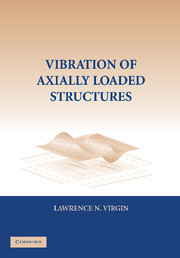Book contents
- Frontmatter
- Contents
- Foreword
- Preface
- 1 Context: The Point of Departure
- 2 Elements of Classical Mechanics
- 3 Dynamics in the Vicinity of Equilibrium
- 4 Higher-Order Systems
- 5 Discrete-Link Models
- 6 Strings, Cables, and Membranes
- 7 Continuous Struts
- 8 Other Column-Type Structures
- 9 Frames
- 10 Plates
- 11 Nondestructive Testing
- 12 Highly Deformed Structures
- 13 Suddenly Applied Loads
- 14 Harmonic Loading: Parametric Excitation
- 15 Harmonic Loading: Transverse Excitation
- 16 Nonlinear Vibration
- Index
- Plate section
5 - Discrete-Link Models
Published online by Cambridge University Press: 05 May 2010
- Frontmatter
- Contents
- Foreword
- Preface
- 1 Context: The Point of Departure
- 2 Elements of Classical Mechanics
- 3 Dynamics in the Vicinity of Equilibrium
- 4 Higher-Order Systems
- 5 Discrete-Link Models
- 6 Strings, Cables, and Membranes
- 7 Continuous Struts
- 8 Other Column-Type Structures
- 9 Frames
- 10 Plates
- 11 Nondestructive Testing
- 12 Highly Deformed Structures
- 13 Suddenly Applied Loads
- 14 Harmonic Loading: Parametric Excitation
- 15 Harmonic Loading: Transverse Excitation
- 16 Nonlinear Vibration
- Index
- Plate section
Summary
Introduction
We first consider a number of discrete-link models in which system properties are concentrated at specific locations. The motivation for considering simple mechanical models is that most of the concepts of dynamics and stability issues encountered with continuous systems (e.g., beams, plates) can be observed with discrete systems but are somewhat easier to analyze. In fact the governing equations will tend to be algebraic rather than differential (at least in space), and it is natural to start with a look at systems in which the behavior of the system is completely described by just a single degree of freedom.
An Inverted Pendulum
Consider the simple hinged cantilever illustrated in Fig. 5.1. This system consists of a concentrated mass supported by a massless but rigid bar of length L. A torsional spring supplies a linear restoring force that is proportional to the angle of rotation of the hinge (in either direction), with spring coefficient K. The angle of rotation θ thus describes the location of the mass at any given instant of time. Typically, the vertical force is simply P = Mg, but here we assume that an axial load of magnitude P acts independently of the fundamental approaches introduced in Chapter 2 for writing the governing equation of motion.
Information
- Type
- Chapter
- Information
- Vibration of Axially-Loaded Structures , pp. 66 - 96Publisher: Cambridge University PressPrint publication year: 2007
